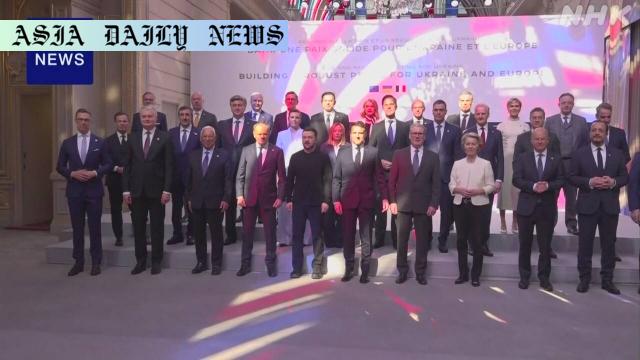Ukraine: Leaders in Paris discuss aid, troop deployment plans and strategic ceasefire monitoring with Russia.

European Leaders Convene in Paris for Ukraine Aid Discussions
On Thursday, prominent European leaders, alongside Ukrainian President Volodymyr Zelenskyy, gathered at a high-profile summit hosted by French President Emmanuel Macron in Paris. The meeting aimed to address critical issues pertaining to aid for Ukraine and the deployment of European troops as part of a broader strategy to end the ongoing conflict with Russia. Ensuring continued support for Kyiv amid its struggle against Russian aggression formed the foundation of the discussions.
Proposals for Strategic Troop Deployment
A key agenda point revolved around a joint Franco-British plan to deploy European forces to Ukraine. This deployment, however, would be conditional on reaching a potential ceasefire agreement with Russia. Macron clarified that any such deployment would involve troops stationed away from the front lines, serving instead as a second-line strategic reserve. This positioning aims to act as a deterrent against the resurgence of Russian aggression while providing Ukraine with the support needed to stabilize and secure its territory. Macron emphasized the progress made in the operational planning of this proposal.
The Role of the United States in Brokering Peace
The United States, under the leadership of President Donald Trump, also played a pivotal role in the ongoing negotiations. A US-brokered agreement with Ukraine and Russia was announced earlier this week, ensuring safe navigation in the Black Sea. However, Russia has tied the implementation of this truce to the conditional lifting of certain sanctions. This further complicates the geopolitical landscape, highlighting the challenges of achieving consensus among global powers. Moreover, the European leaders have expressed concerns over whether the U.S. would commit to providing adequate security assurances to ensure the successful deployment of European forces in Ukraine.
Challenges to Consensus Among European Nations
Despite progress, significant challenges remain. Diverging views within European nations have caused delays in reaching a final agreement on troop deployment. Concerns over the approach, scale, and funding of such an operation have sparked debates among the participating leaders and member states. Macron’s summit represents an important step towards harmonizing these perspectives, yet questions over long-term sustainability and collective responsibility persist. Additionally, Europe’s willingness to take on this substantial commitment without more robust American security guarantees remains a contentious issue.
Russia’s Preconditions and Geopolitical Dynamics
Russia’s demand for sanction relief continues to be a major hurdle in cementing a workable ceasefire. Moscow’s strategy echoes broader geopolitical considerations, as it seeks to leverage the situation to reduce economic pressures that have been exacerbated by the ongoing conflict. Western nations have, thus far, remained steadfast in maintaining sanctions, linking any alleviation to concrete steps by Russia to de-escalate its aggression in Ukraine. This delicate balancing act underscores the complexities of negotiating peace in a fiercely contested region. Indirectly, the outcome of these discussions could redefine the contours of global diplomacy in response to security threats.
The Global Stakes of European Unity
The ongoing situation not only tests the resilience of Ukraine but also the unity of the European Union and its allies. A successful resolution would reaffirm European solidarity and demonstrate the strength of international cooperation in addressing shared security challenges. However, failure to reach an agreement could exacerbate divisions among member states and provide further leverage to adversaries like Russia. The stakes are high, with long-term implications for regional stability and the balance of power both within and beyond Europe.
Commentary
The Importance of Supporting Ukraine Amidst Conflict
The ongoing discussions in Paris reflect the tireless effort required to address the complexities of the Ukraine-Russia conflict. The summit underscores the imperative for European nations and their allies to remain steadfast in their commitment to supporting Ukraine, not simply as a geopolitical strategy, but as a moral responsibility. Ukraine, as a sovereign nation, deserves the backing of the global community to restore peace and stability. It is encouraging to see Europe stepping up, but a cohesive and unified strategy is crucial to maximize the effectiveness of aid and deployment efforts.
Strategic Deployment: A Balancing Act
The proposed deployment of European troops in a non-frontline role highlights the need for a nuanced approach. On one hand, this strategy offers a security buffer for Ukraine, while on the other hand, it signals to Russia that aggression will not go unanswered. However, there are valid concerns about whether this plan can be executed effectively without provoking further tensions. It is a delicate balance between ensuring Ukraine’s safety and avoiding actions that could escalate an already volatile situation. Coordination between European allies and the U.S. will be critical in navigating this sensitive terrain.
Unity and Leadership in Troubled Times
Ultimately, the outcome of these talks serves as a barometer for Europe’s unity and leadership on the global stage. The involvement of nearly 30 countries and organizations sends a strong message of solidarity, but the true test lies in translating dialogue into action. Europe faces the dual challenge of maintaining internal cohesion while responding decisively to external threats. For Ukraine, the unwavering support of its allies could mean the difference between enduring conflict and a pathway to lasting peace and prosperity. The road ahead is undoubtedly fraught with challenges, but the collective resolve of the international community can offer a beacon of hope for a brighter future.


